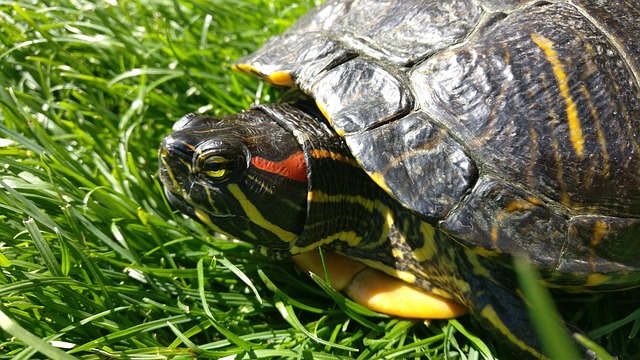Red-eared sliders are a popular species of aquatic turtles commonly kept as pets. As with any pet, owners want to ensure their red-eared sliders get the proper nutrition to maintain a healthy and happy life.
One question often arises is whether or not red-eared sliders can eat guppies.
Guppies are small, freshwater fish often used as feeders for aquatic pets. While red-eared sliders are omnivores and can eat various foods, including fish, it is essential to consider the food’s nutritional value.
Guppies are not a primary food source for red-eared sliders in the wild, and feeding them to your turtle may not provide the necessary nutrients for optimal health.
Additionally, guppies may contain parasites or diseases that could harm your turtle if not adequately sourced and prepared.
Can Red-Eared Sliders Eat Guppies?
Overview
Red-eared sliders are omnivorous turtles that feed on both plant and animal matter. Guppies are small freshwater fish that are often kept as pets. Many turtle owners wonder if their red-eared sliders can eat guppies as part of their diet.
Nutritional Value of Guppies
Guppies are an excellent protein source, an essential nutrient for red-eared sliders. They also contain vitamins and minerals such as vitamin D, calcium, and phosphorus. However, guppies are not a complete diet for turtles and should only be fed as a supplement to their regular diet.
Potential Risks
While guppies are generally safe for red-eared sliders to eat, there are some potential risks. For example, guppies may carry parasites or diseases that can harm turtles.
Additionally, if a turtle eats too many guppies, it may result in an unbalanced diet and health problems.
Feeding Frequency and Quantity
Red-eared sliders should only be fed guppies occasionally as a treat rather than as a regular part of their diet. A good rule of thumb is to feed them no more than one or two guppies per week.
Monitoring the turtle’s behavior and health after feeding is essential to ensure they are not experiencing any adverse effects.
In conclusion, while guppies can be a tasty treat for red-eared sliders, they should not be relied upon as a primary food source. Instead, turtle owners should always provide a balanced diet that includes a variety of foods to ensure their pet’s health and well-being.
Alternatives to Guppies
When it comes to feeding red-eared sliders, there are many options available besides guppies. In addition, some alternatives can provide a balanced and nutritious diet for your pet turtle.
Commercial Turtle Food
One of the most accessible and convenient options for feeding red-eared sliders is commercial turtle food. These pellets are specifically formulated to meet the nutritional needs of turtles and can be found at most pet stores.
They come in various sizes and formulas, so choosing one that is appropriate for your turtle’s age and size is essential.
Live Prey
Red-eared sliders are natural predators and enjoy chasing and catching live prey. Some good options for live prey include crickets, mealworms, and earthworms. These can be purchased at pet stores or caught in your backyard.
It’s essential to ensure any live prey you offer is appropriately sized for your turtle and that it’s not carrying any diseases.
Vegetables and Fruits
Red-eared sliders are omnivores and enjoy a variety of fruits and vegetables in their diet. Some good options include leafy greens like kale and spinach and carrots, squash, and berries. It’s essential to offer a variety of fruits and vegetables to ensure your turtle gets all the nutrients it needs.
Overall, many alternatives to guppies can provide a balanced and nutritious diet for red-eared sliders. Whether you choose commercial turtle food, live prey, or fruits and vegetables, it’s essential to ensure your turtle gets all the nutrients it needs to stay healthy and happy.
Conclusion
In conclusion, red-eared sliders can eat guppies, but making it a regular part of their diet is not recommended. While guppies are an excellent source of protein for turtles, they are also high in fat and lack essential nutrients that turtles need to maintain a healthy diet.
I remember that a turtle’s diet should consist of various foods, including commercial turtle pellets, fresh vegetables, and occasional treats such as insects or small amounts of fish. A balanced diet will ensure the turtle receives all the necessary nutrients and vitamins.
If you decide to feed your red-eared slider guppies, it is essential to ensure that the fish are not carrying any diseases or parasites that could harm your turtle. It is also necessary to monitor your turtle’s health and behavior after feeding them guppies to ensure they are digesting the food properly and not experiencing any adverse effects.
While guppies can be a tasty treat for red-eared sliders, they should not be relied upon as a primary food source. Instead, a balanced diet of various foods will ensure your turtle stays healthy and happy.




